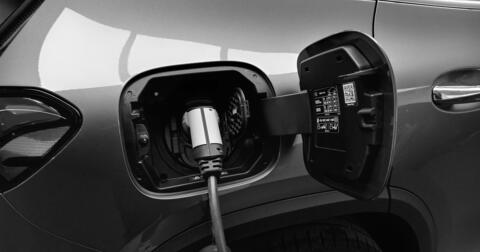Will Shovel-Ready Land Help Michigan Compete for Electric Vehicle Jobs?
Michigan is losing its 'home court advantage' with the Detroit auto industry
Gov. Gretchen Whitmer wants Michigan to be “shovel-ready,” with viable sites to offer builders of electric vehicles. But one of the state’s biggest energy providers is skeptical of the governor's plan.
What’s wrong with this picture?
The Detroit News, on site last week at the Mackinac Policy Conference (no relation to the publisher of Michigan Capitol Confidential), reports a “constant refrain” in Michigan’s economic development community:
“The state needs large sites ready for immediate construction to win the projects. That requires roads, access to highways and railways, water, sewer, and the electric infrastructure capable of powering high-voltage manufacturing plants, particularly for the assembly of electric vehicle batteries.”
It was about this time a year ago, soon after the 2021 Mackinac Policy Conference, that Ford Motor Co. announced its electric vehicles would be built in Tennessee and Kentucky.
Those states would see $11 billion in investment and get 11,000 new jobs between them. What Michigan got from Ford instead was a rehab of a train station in Detroit – a rehab that would not have happened, but for the state funds. Ford said as much.
News stories highlighted not only the generous incentives Kentucky and Tennessee offered Ford to build those factories, but also the massive amounts of land set aside, shovel-ready, for the cause. The thrust of the stories: Michigan has neither the land nor the incentives to compete for the auto jobs of the future.
A year later, Gov. Whitmer says shovel-ready land is her focus, more so than cash incentives.
“We do need to have sites that are big and are ready,” Whitmer told The Detroit News. “When other states can throw cash at companies, we can’t do that in Michigan — and I’m not suggesting we should be able to. But what we can do is come to the table with sites ready to go.”
James Hohman, director of fiscal policy at the Mackinac Center, questioned the need for shovel-ready land.
“Whenever I see someone calling for a new program for something like this, whether it’s infrastructure development or whatever thing du jour is allegedly holding back Michigan, I try to look for evidence,” Hohman said. “There’s a real problem here: There’s been none presented.”
Hohman added: “It's not like, ‘here’s this project, we can’t do it because,’ or ‘here’s evidence that there’s a substantial number of businesses that are facing this problem and it’s a real thing in Michigan.’”
Hohman noted that Michigan already has similar programs.
“We have transportation infrastructure assistance,” Hohman said. “We have tons of greenfield sites next to highways connected with electricity and city water and basically anything else you need. So what’s really the issue here? On top of that, we already have a blank check program that can spend however much you want on site readiness, for whatever reason, as part of last December’s incentives.”
Hohman was referring to the Michigan Economic Development Corporation’s strategic site readiness plan.
“Michigan must create a new ‘home court’ advantage,” reads a line of the MEDC announcement.
The package of bills also included the critical industry investment program.
The auto industry is considered critical to Michigan’s future. But things have mostly gotten worse for the Michigan auto industry since Ford’s announcement about the electric vehicle plants.
Ford announced in March that it would split its electric vehicle projects – its future – and internal combustion projects – its past – into different units.
In late May, Stellantis (Chrysler) announced it would take its $2.5 billion electric vehicle factory to Indiana, in collaboration with Samsung.
For a state whose automotive heritage runs more than a century deep, the three announcements brought on a fear that the industry that undergirded it so long is leaving – that Detroit is the auto industry’s past, not its future.
At the 2022 Mackinac Policy Conference, Ford addressed those fears. It announced a $3.2 billion investment that will bring 6,200 new jobs to Michigan, Ohio, and Missouri.
“Michigan is our own home state, always has been. From Michigan, we will chart the course of transforming transportation,” said Steve Croley, chief policy officer for Ford.
Michigan was never a true contender for the Kentucky and Tennessee jobs, the MEDC has admitted. The Whitmer administration argued that the incentives and the land, combined, offered Ford a package that Michigan could not match.
Hence the focus on shovel-readiness.
The Detroit News reports the state is eyeing a “1,700-acre plot of farmland at I-94 and I-69” near Marshall as a possible site.
But the Marshall plan has a skeptic in DTE Electric President Trevor Lauer, who questioned if that investment would be made, and who would pay for it.
“Every time somebody tells me they’re looking at the Marshall site, they’re just telling me that they want to kill the project off,” Lauer told the publication.
“If you tell me to come in and wire a site from start, it’s going to take me 18 to 24 months to pull the infrastructure in — and that’s in the best case — to have it fully ready,” Lauer said. “Having a site that's ready is a big deal from an economic development perspective.”
“But somebody has to pay for it,” Lauer added.
Last month, Michigan Capitol Confidential reported that Michigan taxpayers are paying more than a billion dollars to support the government’s vision of a future with electric vehicles.
How much more will it cost taxpayers to attract EV jobs, and to ready the land for the bids?
Michigan Capitol Confidential is the news source produced by the Mackinac Center for Public Policy. Michigan Capitol Confidential reports with a free-market news perspective.

